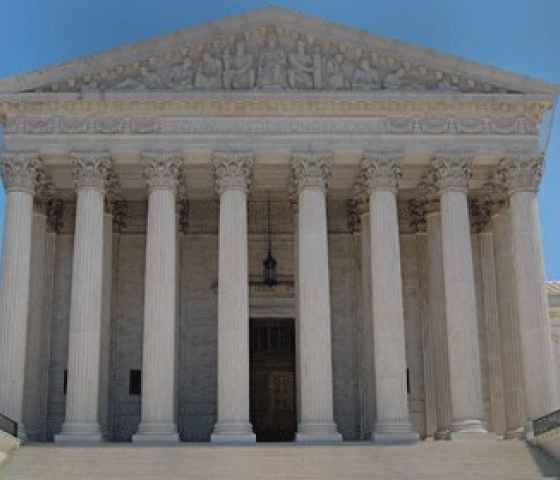First Merrick Garland’s stolen seat, now Kennedy’s retirement. It’s a one-two gut punch that has left those of us who treasure the cause of freedom and equality deeply distressed about the direction that the U.S. Supreme Court will almost certainly take for the better part of a generation. Assuming that Trump’s pick for Kennedy’s replacement, Judge Brett Kavanaugh, is confirmed by the Republican-held Senate, the court will have a clear 5-4 majority of justices who are likely to be consistently hostile to reproductive freedom, LGBTQ+ rights, voting rights, privacy rights, immigrants’ rights, and the plight of the poor.
So what does this mean for us? Expanding freedoms through sweeping supreme court cases like Obergefell v. Hodges, the ACLU case that won the freedom to marry for same sex couples, and Doe v. Bolton, which, along with Roe v. Wade, established a woman’s right to abortion, is almost synonymous with the ACLU. Indeed, the ACLU appears before the U.S. Supreme Court more often than any other group or organization other than the federal government’s own Department of Justice. So what does the ACLU’s mission look like in an era where the highest court in the land is likely to be hostile to most of our entreaties?
Because of this new reality, I believe that in the coming years some of our greatest opportunities for defending and advancing freedoms in America will happen at the state level. For much of its history, the ACLU has built the legal infrastructure of freedom from the top down with these big historic supreme court cases. Now it is imperative we build from the ground up, starting in our own communities, in our own state courts and legislatures. We’ve already seen how effective that can be. Here in New Mexico, for example, the ACLU of New Mexico’s lawsuit Griego v. Oliver won the freedom to marry for New Mexicans in 2013, two years ahead of Obergefell v. Hodges. As U.S. Supreme Court Justice Louis Brandeis famously once stated, “States are the laboratories of democracy.” Even in the age of Trump, we have ample opportunity to build the kind of free and just society right here in New Mexico that we one day hope to see span from coast to coast.
The seismic shift in the makeup of the Supreme Court means we must also continue to look beyond the courts for opportunities to influence the future of freedom in our country. Since the advent of the Trump administration, the ACLU has made significant investments in its organizing and lobbying programs. Although we are a nonpartisan organization, meaning we don’t endorse specific candidates for office, that doesn’t mean we cannot wield significant political power and influence at every level of government. Here in New Mexico, we’re organizing our supporters around critical issues facing our communities, including protecting access to reproductive healthcare, reforming the Albuquerque police department, ending mass incarceration, and fighting Trump’s deportation machine.
This is not to say we can simply ignore the U.S. Supreme Court, however. It’s decisions will continue to have a profound impact on our lives. For example, if the court’s new majority sets its sights on overturning Roe v. Wade, it could have disastrous consequences for New Mexican women who rely on access to safe and legal abortion as an essential part of reproductive health care. As of this writing, pre-Roe language criminalizing abortion is still on New Mexico law books. Although New Mexico’s criminal abortion statute has been unenforceable since 1973, that could change if Roe was overturned. That’s why one of the ACLU of New Mexico’s top legislative priorities in 2019 will be to pass a bill through New Mexico’s legislature that will repeal this outdated, stigmatizing, and dangerous language from our criminal code. If the worst happens, we must ensure that women and families in New Mexico will continue to have access to the full range of reproductive health options, including safe and legal abortion.
In summation: yes, things look pretty bleak in the Supreme Court right now. But the ACLU is more than just a fierce Supreme Court litigator. In fact, at the ACLU’s founding in the early 20th century, the courts were so unsympathetic to civil liberties that the ACLU pursued litigation mostly in the hopes of exposing the courts’ hypocrisy. One of the ACLU’s earliest documents was a handbill produced in 1920 entitled Maintain Your Rights, which exhorted that “Rights can be maintained only by insisting upon them, --by organization, protest, demonstrations, test cases in the courts, and publicity.”
The ACLU understood even then that litigation is but one of many tools that can be strategically employed to maintain one’s rights. What was true then remains true today. We have a lot of tools in our belt, and we’re ready to get to work.
This letter originally appeared in the 2018 Summer Torch.
